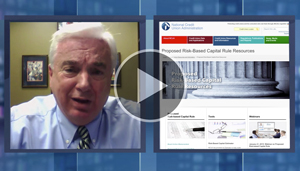Links in “NCUA”
- NCUA Claims RBC Rule Only Adversely Impacts 16 Credit Unions
NCUA says that if the final RBC rule was to take effect today that only 16 credit unions would have to raise capital or reduce risk in order to comply. Chairman Matz pointed out that those 16 credit unions hold assets of $10 billion, which is about the same size as the share insurance fund. She added that if one of those credit unions failed the impact on all credit unions would be significant. [10/16/15]
- NCUA Finalizes Risk-Based Capital Rule
After 2,100 comment letters, several town hall meetings, pressure from Congress to delay finalization, the NCUA Board voted yesterday to approve a final rule on risk-based capital that reflects only minor changes from the proposed RBC2. The final rule reduces the risk weighting for most investments in CUSOS and for charitable donation accounts to 100%. The final rule is effective 1/1/19. [10/16/15]
- Hensarling Urges Matz to Delay RBC2
In a last minute push, Jeb Hensarling, Chair of the House Financial Services Committee, has sent a strongly-worded letter to NCUA Chair Debbie Matz urging her to delay todayâs scheduled vote on a final risk-based capital rule. Hensarling referenced pending legislation in the House that would require NCUA to conduct an impact study before finalizing the rule and additional research on the agencyâs legal authority to finalize and enforce RBC2. [10/15/15]
- Biggest Worry About RBC2: The “Wild Card”
The second risk-based capital rule, which the NCUA is expected to vote on Thursday, includes what is being called the "wild card" on capital adequacy that would allow examiners to determine that a credit union has insufficient capital, regardless of what the ratios are. [10/13/15]
- Risk Watch 73: Risk-Based Capital â What You Really Need to Know
With the NCUA expected to address its Risk-Based Capital Rule on 10/15, Former NCUA Chair Dennis Dollar cuts through all the hullabaloo and breaks down what you really need to know about the proposal as well as what you can expect going forward. Bonus points for doing it in plain English. [10/9/15]
- Matz: Full Steam Ahead on RBC2
In response to Congressional concerns that the NCUA's plans for risk-based capital might be proceeding too hastily, NCUA's chair seeks to assure Congress, even while moving forward with putting the rule on the board meetings Oct. 15 agenda, that its measure will allow credit unions to continue to support the economy. Also see Risk Watch 73 for RBC2 overview. [10/9/15]
- Matz Warns CUsâ Future is with Younger Members
NCUA Chair Debbie Matz told the attendees at the National Directors Roundtable Conference that those credit unions that are not successful in attracting younger consumers may not survive. Matz reported that the average age of a credit union member is 47, while the peak borrowing years for consumers is 25 to 44, adding that offering the latest technology and promoting credit unions through new media may be key to survival. [10/8/15]
- Senate Cybersecurity Bill Does Not Include Third Party Vendor Exam Authority
This month the Senate will consider almost two dozen amendments to the Cybersecurity Information Sharing Act, but none of these amendments include giving NCUA authority to examine third party vendors. Senator Elizabeth Warren had proposed an amendment giving NCUA the expanded exam authority, but the amendment was dropped following  an outcry from the industry. [10/8/15]
- NCUA Prepared to Assist SC Credit Unions
NCUA announced that is regional office staff is contacting credit unions in South Carolina that have been affected by flooding to offer assistance in maintaining or restoring operations. The Office of Small Credit Unions is prepared to provide urgent needs grants of up to $7,500 for low-income credit unions. [10/6/15]
- NCUA Issues Supervisory Letter on Fixed Asset Management
The 5% limit on fixed assets for federal credit unions expired on October 5, 2015. NCUA states that examiners will no longer be focusing on fixed assets at federally-insured credit unions unless that credit union has an unresolved DOR, enforcement action or outstanding waiver related to a fixed asset issue, the credit union has weak earnings or other structural issues, fixed assets exceed 5%, or the credit union has or is planning to make a major acquisition of premises since the last exam. [10/5/15]



